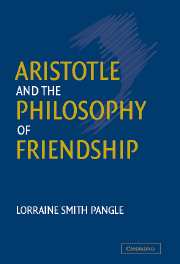Book contents
- Frontmatter
- Contents
- Acknowledgments
- Introduction
- 1 The Challenge of Plato's Lysis
- 2 The Three Kinds of Friendship
- 3 Aristotle and Montaigne on Friendship as the Greatest Good
- 4 Friendships in Politics and the Family
- 5 Cicero's Laelius: Political Friendship at Its Best
- 6 Quarrels, Conflicting Claims, and Dissolutions
- 7 Friends as Other Selves
- 8 Goodwill, Concord, and the Love of Benefactors
- 9 Self-Love and Noble Sacrifice
- 10 Friendship in the Happy Life
- Notes
- Bibliography of Modern Works and Editions
- Index of Names
10 - Friendship in the Happy Life
Published online by Cambridge University Press: 04 July 2009
- Frontmatter
- Contents
- Acknowledgments
- Introduction
- 1 The Challenge of Plato's Lysis
- 2 The Three Kinds of Friendship
- 3 Aristotle and Montaigne on Friendship as the Greatest Good
- 4 Friendships in Politics and the Family
- 5 Cicero's Laelius: Political Friendship at Its Best
- 6 Quarrels, Conflicting Claims, and Dissolutions
- 7 Friends as Other Selves
- 8 Goodwill, Concord, and the Love of Benefactors
- 9 Self-Love and Noble Sacrifice
- 10 Friendship in the Happy Life
- Notes
- Bibliography of Modern Works and Editions
- Index of Names
Summary
In Chapter 9 of Book 9, Aristotle gives his deepest reflections on the relationship of friendship to human neediness. As he does so, he brings his discussion of friendship onto a new plane. He mentions happiness for the first time in Books 8 and 9, and mentions it repeatedly. In connection with the new focus on happiness, several other themes now come prominently to the fore, including those of nature, pleasure, human self-sufficiency, and the philosophic life. Gently but persistently, Aristotle presses the question of why a truly happy man will need friends, clearly implying that if he feels no such need, he will not love. This need may not be a need for anything separable that arises out of friendship; it may be a simple need to love, an inclination to concern oneself with and contribute to the happiness of others. We have hitherto regarded this inclination or need as an irreducible part of human nature. But Aristotle now asks how such a need can be explained, and how its satisfaction fits together with the satisfactions of the other wants and needs that collectively constitute human happiness.
The question becomes important at this point because of Aristotle's argument in 9.4 that good men can be their own best friends and especially because of what he has shown in 9.8 about the self-love of noble souls.
- Type
- Chapter
- Information
- Aristotle and the Philosophy of Friendship , pp. 183 - 200Publisher: Cambridge University PressPrint publication year: 2002

